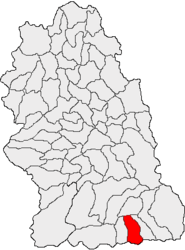Vulcan (Romanian pronunciation: [vulˈkan]; formerly Jiu-Vaidei-Vulcan; Hungarian: Vulkán, Zsilyvajdejvulkán (Zsily-Vajdej-Vulkán); German: Wolkendorf, Wulkan) is a city in Hunedoara County, Transylvania, Romania. With a population of 19,772 as of 2021, it is the second-largest city in the Jiu Valley. It administers two villages, Dealul Babii ("Old Woman's Hill" in Romanian; Hegyvulkán) and Jiu-Paroșeni (Zsilymacesdparoseny).
Vulcan | |
|---|---|
 Mihai Viteazul Boulevard, the main street in Vulcan | |
 Location in Hunedoara County | |
| Coordinates: 45°22′52″N 23°17′29″E / 45.38111°N 23.29139°E | |
| Country | Romania |
| County | Hunedoara |
| Government | |
| • Mayor (2020–2024) | Cristian-Ion Merișanu[1] (PRO) |
Area | 87.31 km2 (33.71 sq mi) |
| Elevation | 603 m (1,978 ft) |
| Population (2021-12-01)[2] | 19,772 |
| • Density | 230/km2 (590/sq mi) |
| Time zone | EET/EEST (UTC+2/+3) |
| Postal code | 336200 |
| Area code | (+40) 02 54 |
| Vehicle reg. | HD |
| Website | www |
Name
editThe city is named after the Vulcan Pass that connects the Jiu Valley to Oltenia, itself being derived from Slavic "vlk", meaning "wolf" (even if "vulcan" means "volcano" in Romanian).
Geography
editVulcan is located at the southern extremity of Hunedoara County, about 100 km (62 mi) from the county seat, Deva, on the border with Gorj County. It is situated in a hilly area north of the Vâlcan Mountains, on the banks of the Jiul de Vest and its tributaries, the rivers Merișoara and Crevedia.
The city is crossed by national road DN66A, which connects it to nearby Aninoasa and to Petroșani, 11 km (6.8 mi) to the northeast, and to Lupeni, 7 km (4.3 mi) to the west. County road DJ664 leads to the Vulcan Pass, 8 kilometres (5 mi) to the south, and on to Schela, Gorj, while county road DJ666 leads north to Dealul Babii village and Bănița commune.
The Vulcan train station serves the CFR Line 214, a 17 km (11 mi) railway from Livezeni (in Petroșani) to Lupeni.
History
editThe coal resources of the region were discovered in 1788 while the Austrian General Landau defended Vulcan from the Ottoman Turks. One night the soldiers could not put out the camp fire they made, as the piles of coal underneath had caught fire. General Landau thought that he could stop the Turks without a fight by setting piles of coal on fire. The Turks noted the large numbers of fires on the heights and thought that the Austrian army was much larger than theirs and retreated.
In 1850, the first mine was set up by the Hoffman brothers of Brașov.
Demographics
edit| Year | Pop. | ±% |
|---|---|---|
| 1956 | 14,859 | — |
| 1966 | 21,979 | +47.9% |
| 1977 | 28,664 | +30.4% |
| 1992 | 34,524 | +20.4% |
| 2002 | 33,186 | −3.9% |
| 2011 | 24,160 | −27.2% |
| 2021 | 19,772 | −18.2% |
| Source: Census data | ||
At the 2021 census, Vulcan had a population of 19,772.[3] This marked a decrease of 18.2% from the 2011 census, when the city had 24,160 inhabitants; of those, 92.91% were Romanians, 5.13% Hungarians, 1.41% Romani, and 0.2% Germans.
People
edit- Pius Brânzeu (1911–2002), doctor and member of the Romanian Academy
- Ernő Csíki (1875–1954), Hungarian entomologist
- Andrej Prean Nagy (1923–1997), Hungarian footballer
- Ștefan Onisie (1925–1984), footballer and manager
- Leonard Wolf (1923–2019), Romanian-American author
Sports
editThe local football team is CSM Vulcan, currently playing in Liga IV Hunedoara. Its home ground is Stadionul Central.
Twin cities
editList of Vulcan's sister and twin cities:[4]
See also
editReferences
edit- ^ "Results of the 2020 local elections". Central Electoral Bureau. Retrieved 8 June 2021.
- ^ "Populaţia rezidentă după grupa de vârstă, pe județe și municipii, orașe, comune, la 1 decembrie 2021" (XLS). National Institute of Statistics.
- ^ "Populația rezidentă după grupa de vârstă, pe județe și municipii, orașe, comune, la 1 decembrie 2021" (in Romanian). INSSE. 31 May 2023.
- ^ "Grad Bor 3. oktobra slavi svoj dan. Dolaze gosti iz Ukrajine, Makedonije i Rumunije, ali ne i Francuzi, Crnogorci i Kinezi" (website). Istmedia. Retrieved 2 October 2019.
External links
edit- "Jiu Valley Portal". www.jiuvalley.org. — the regional portal host of the official Jiu Valley municipal websites

